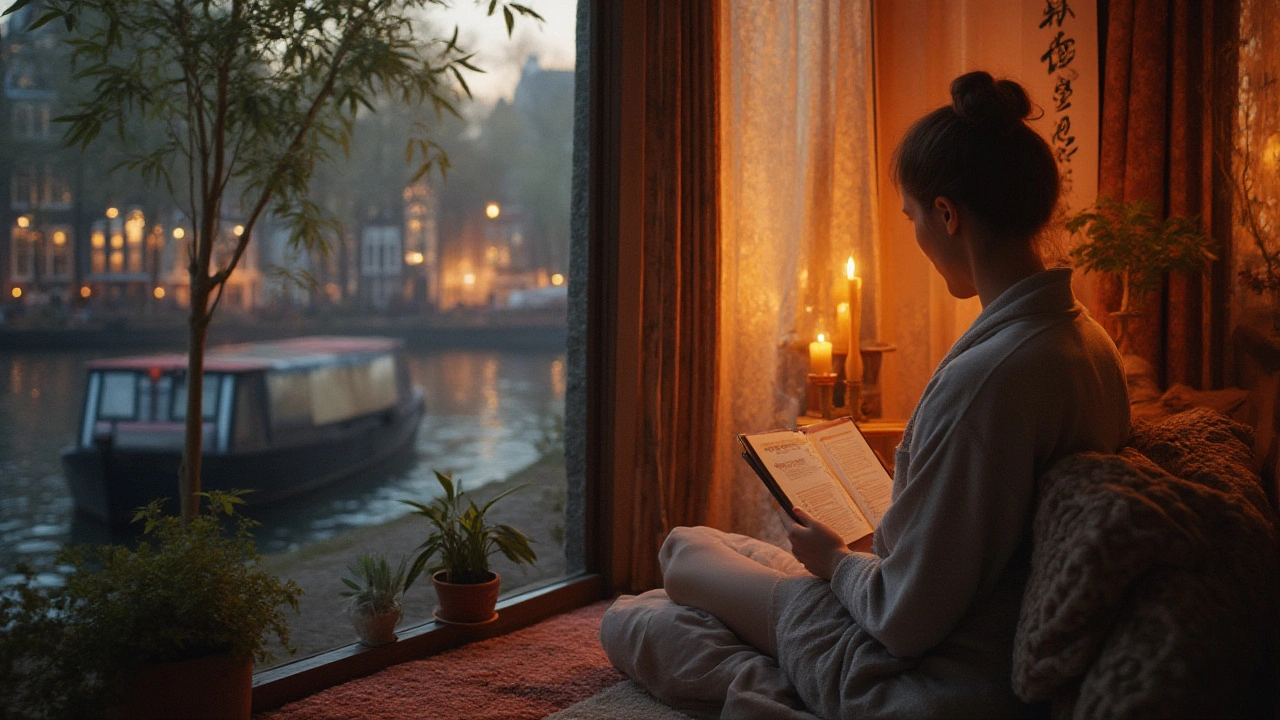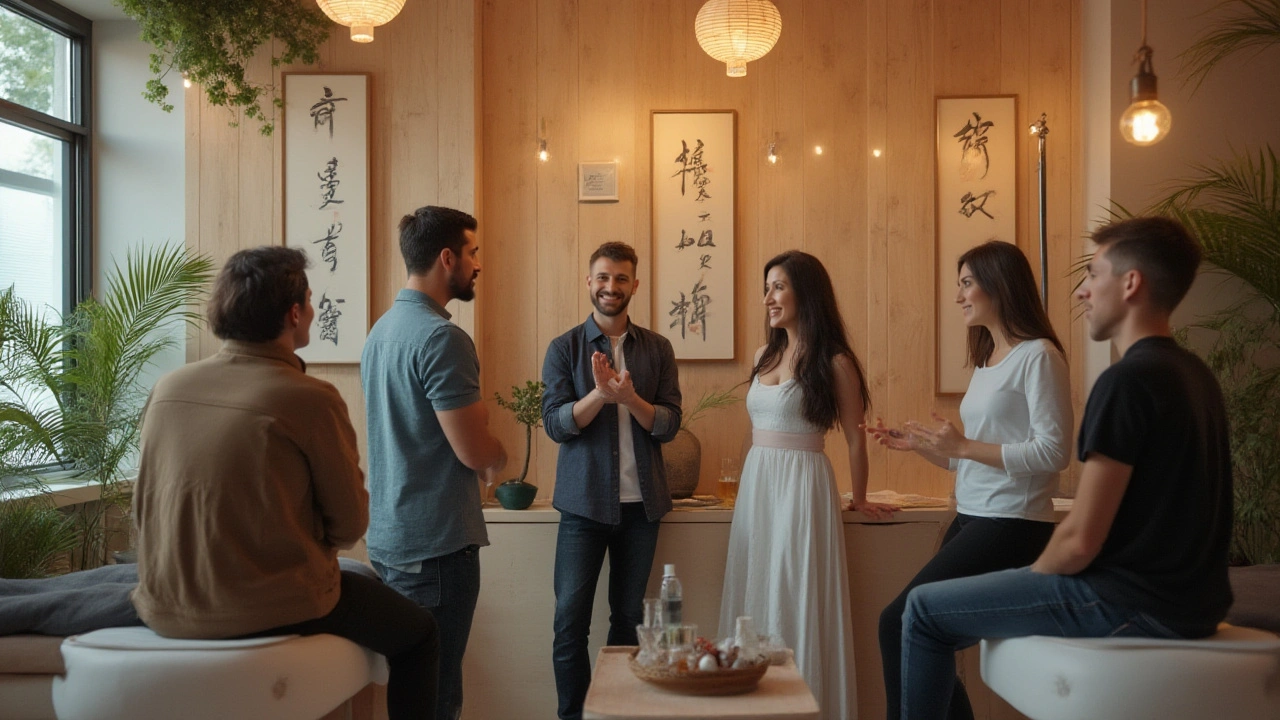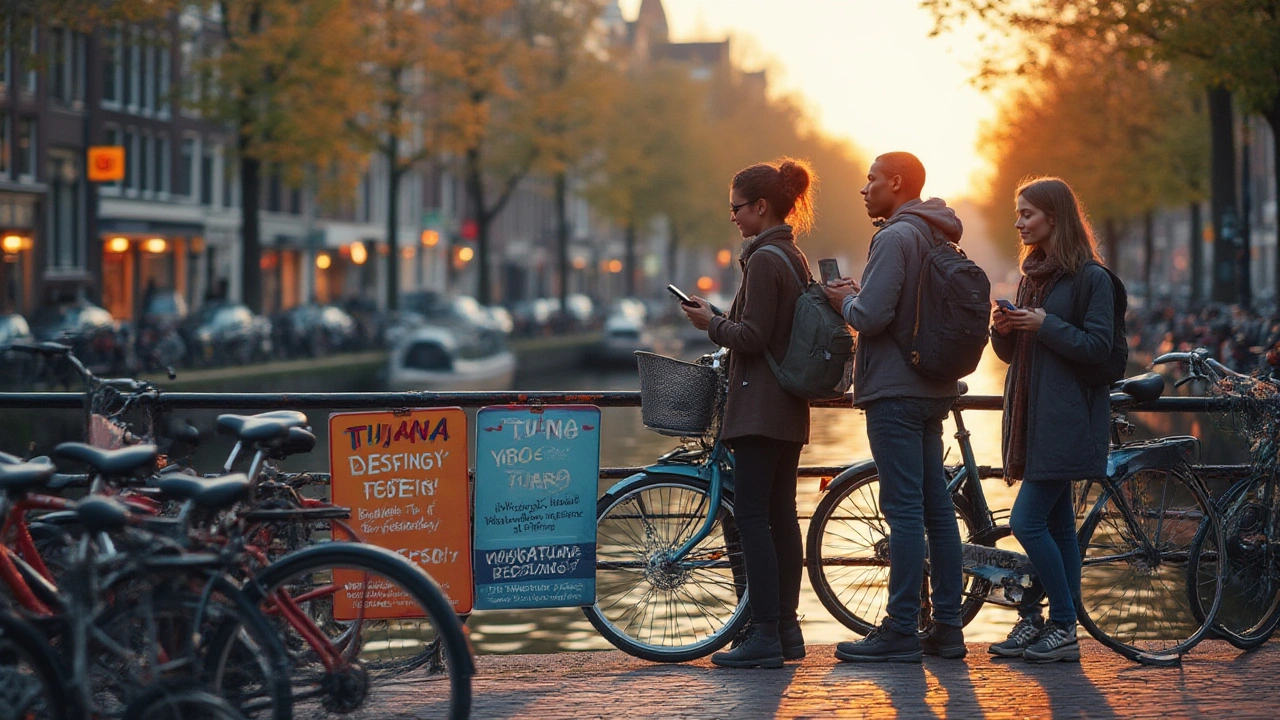Tuina Massage Amsterdam: Experience Traditional Chinese Healing for Body and Mind

Ever wonder why some massages seem to just melt away your tension while others leave you only a little refreshed? Traditional Chinese Tuina massage isn’t just about making you feel relaxed (though you absolutely will)—it’s a powerful healing tradition that’s been around for thousands of years, quietly helping people find balance and ease both in their bodies and minds. If you’re reading this in bustling Amsterdam, maybe with stiff shoulders from your bike commute or stress from work, Tuina might just be the reset you need. People who give Tuina a try often walk away surprised by how different they feel—not just looser muscles, but clearer heads, a boosted mood, and sometimes even relief from nagging pains that wouldn’t budge.
- Tuina massage is a cornerstone of Chinese medicine—think acupuncture, but with hands instead of needles.
- Sessions focus on body energy flow, pain relief, and deep relaxation using ancient pressure and movement techniques.
- Amsterdam offers a range of Tuina options, from clinical practices to soothing wellness studios.
- Expect a tailored session based on your unique needs—no two Tuina massages are ever quite the same.
- Pricing depends on the provider, session length, and extras. Safety and professional standards are easy to gauge with the right questions.
Direct Answer: What Is Tuina Massage and Why Should You Try It?
Tuina (pronounced twee-nah) massage is a hands-on Chinese therapy that dates back over 2,000 years. Originating from the ancient philosophies of Traditional Chinese Medicine (TCM), it uses rhythmic pressure, stretching, and other techniques to balance the body’s energy—what practitioners call “qi.” Unlike Swedish massage, which is mostly about relaxing the muscles, Tuina goes further. The therapist works directly with meridian pathways and acupoints to address pain, boost circulation, and even help with headaches or digestive troubles. This makes Tuina a favorite for people dealing with chronic pain, tight muscles from daily life, or stress that just won’t quit. If you’re looking for something beyond the typical spa experience, Tuina offers a way to hit the reset button, both physically and mentally.
Comprehensive Guide to Tuina Massage
Picture this: you walk into a small, warmly lit studio in Amsterdam’s Jordaan neighborhood. There’s the faint scent of herbs and a gentle hum of calming music. A friendly practitioner greets you, and before any touch, they ask about your health, your stress, anything you want to work on. This is the start of a Tuina session—and it sets the tone for a very different massage experience. Tuina literally means "push and grasp,” describing a set of precise hands-on movements designed to move blockages (think of a river that’s clogged and needs clearing). The concept’s not woo-woo; research even backs up its power. For example, a 2020 study from the Journal of Integrative Medicine found Tuina reduced neck pain and improved range of motion better than simple rest or medication. It’s not uncommon to meet people who tried Tuina for back pain and ended up sleeping better, feeling happier, and swapping coffee for herbal teas because their digestion improves. Therapists might use their fingers, knuckles, elbows, or even gentle stretches, always adapting each move to your needs. No two sessions are quite alike, and the therapists often treat you holistically, making you feel seen—not just as a sore back, but as a whole, complex human.
There’s something deeply personal about Tuina. Maybe it’s the practitioner’s careful attention to your feedback, or maybe it’s the way the massage energizes you without feeling too rough or too gentle. Some people compare it to getting acupuncture and physiotherapy at the same time—but there are no needles involved. It’s all muscle, movement, and intuition, with roots in ancient wisdom but results that show up in your everyday wellbeing. Imagine not just walking taller physically, but also feeling lighter emotionally, sharper mentally, and more at home in your body. That’s the real draw of Tuina.
Definition and Context: What Sets Tuina Apart?
Let’s get into the details. Tuina is one of the four main branches of Traditional Chinese Medicine, right along with acupuncture, herbal medicine, and qi gong. It’s unique because it’s both medical and relaxing—a real rarity in the world of massage therapies. Rather than focusing just on muscles and tension, Tuina’s goal is to restore harmony to your body’s natural energy flow. Therapists use specific sequences of movements, applying pressure to certain points (acupoints) to clear energy blockages. This isn’t just hype. The meridian system matches up in surprising ways to modern anatomical knowledge—some acupoints are now known scientifically to be near nerve clusters or trigger points that impact pain.
There’s a rich context here: in Amsterdam, where people love cycling, tight calves, lower back pain, or stiff necks are all too common. Tuina addresses these complaints at their root. The focus isn’t only muscle relaxation, but fixing the underlying imbalance that causes your issues in the first place. Think of it as fixing a leaky roof, not just mopping up the floor. The therapist might combine kneading, rolling, pressing, even gentle shaking to reach deeper layers of tissue or tap into the nervous system. It’s common to feel warmth and tingling sensations—signs of increased energy flow during a session. One fascinating thing is that Tuina is often recommended as part of rehab for injuries in Chinese hospitals.
But even if you're just stressed out or feeling off, Tuina isn’t reserved for medical complaints. People book sessions to boost immunity, get better sleep, or just feel more in tune amid busy city life. And yes, it’s absolutely suitable for both first-timers and experienced massage fans.
Benefits of Tuina Massage
So, what makes Tuina so game changing? The benefits are both immediate and long-lasting. You might notice sore spots melting away during your first session, but the real shifts often come a few days later. For starters, Tuina is especially effective for chronic muscle pain, sports injuries, joint stiffness, and even tension headaches. According to a study in the journal Evidence-Based Complementary and Alternative Medicine (2022), Tuina significantly improved outcomes for patients with lower back pain, even when compared with Western physical therapy.
Beyond pain management, Tuina works wonders for stress and mental wellbeing. Part of this comes from its impact on the nervous system. Regular clients report better sleep, fewer anxiety symptoms, and a general sense of resilience in the face of daily challenges. Tuina’s work on the digestive system is noteworthy too—more than a few Amsterdammers rave about post-massage digestive comfort, even when other therapies let them down. For parents, pediatric Tuina is a gentle way to help kids with stomachaches, coughs, or sleep issues without medication. And it’s a favorite for boosting immune function, especially during gloomy Dutch winters.
- Relieves chronic pain (neck, back, shoulders, joints)
- Improves circulation and lymphatic flow
- Reduces stress, anxiety, and promotes calm
- Speeds recovery from sports injuries
- Supports immunity and digestive health
- Boosts energy and mood—many people feel alert yet calm after
What about side effects? Tuina is considered incredibly safe, especially when done by experienced therapists. Occasionally there’s mild soreness (like a good workout), but that’s usually gone within 24 hours. If you have a medical condition, always check in with your GP before booking.
Types of Tuina Massage Available in Amsterdam
Amsterdam offers a range of Tuina experiences, all catering to slightly different needs and preferences. Here’s a quick map of what’s out there:
- Classic Clinical Tuina: Offered at acupuncture clinics or TCM centers, this style is more medical, focusing on pain, injury, and rehab. You might find practitioners near Amsterdam Zuid or De Pijp who have medical backgrounds and work closely with doctors.
- Wellness Tuina: Found in spas or boutique wellness studios, this type leans towards relaxation and whole-body wellness. Think gentle lighting, soothing music, and sometimes extras like aromatherapy or herbal compresses.
- Pediatric Tuina: If you have kids dealing with sleep issues, colic, or tummy pain, some therapists offer specialized sessions with softer touch. Amsterdam Oud-West and Rivierenbuurt are good places to look—these clinics usually work with families.
- Fusion Tuina: This unique twist blends Tuina with Western bodywork—maybe Swedish or deep tissue for more muscle focus, or Thai stretches for flexibility. Perfect if you want the best of both worlds.
You’ll also find workshops where you can learn the basics of Tuina for self-care or to help partners and family members. These are ideal for curious folks looking to bring a little bit of healing into their own hands—literally!

How to Find Tuina Massage Services in Amsterdam
Ready to try Tuina? Here’s the lowdown on finding the right spot. Start by searching for “Tuina massage Amsterdam”—you’ll come across a mix of medical practices, boutique spas, and holistic wellness centers. Look for therapists who have clear credentials in Traditional Chinese Medicine or who studied at established schools—this info is often front and center on practice websites. Reviews on platforms like Google and Treatwell can clue you in about real experiences from other locals (pay attention to feedback about knowledge, atmosphere, and client care, not just price).
Neighborhoods like De Pijp, Oost, and the Jordaan have clusters of TCM clinics and wellness studios. Several places near Museumplein and Vondelpark even offer Tuina as part of package deals with acupuncture or herbal consults. Some clinics have multilingual therapists—a big plus if you’re not a Dutch native.
A simple tip: call ahead or send a message if you have specific health needs, allergies, or if you want to check on therapist experience. Most reputable places are happy to answer questions before you commit. And don’t forget—you can always ask about a short 30-minute sampler if you’re curious but not ready to commit to an hour-long session.
| Service Type | Typical Price | Booking Method |
|---|---|---|
| Clinical Tuina | €60 - €110/hr | Direct booking or health insurance referral |
| Wellness Tuina | €50 - €90/hr | Online, phone, walk-in at studio |
| Pediatric Tuina | €40 - €65/30 min | Clinic websites, phone |
| Tuina Fusion | €70 - €120/hr | Wellness sites, local platforms |
Tip: Some Dutch insurance plans partially reimburse therapeutic massage if the practitioner has verified credentials. Ask for a receipt if you want to claim.
What to Expect During a Tuina Session
Let’s walk through a typical Tuina journey. When you arrive, you’ll likely be asked about your health, symptoms, current stress, and any goals for the session. Wear comfortable, loose-fitting clothes since Tuina is performed clothed for the most part—no oil required. The therapist might check your pulse or gently press on your belly (TCM style!), which helps them craft a personalized game plan.
You’ll lay on a massage table or mat. The therapist starts with hands-on moves—a mix of rolling, kneading, pressing, and sometimes rocking different parts of your body. Don’t be surprised if they focus on areas far from where you feel pain; energy pathways travel the length of your body, and the root cause isn’t always at the pain site. The pressure is usually firm but not painful. If it is, always speak up! Communication matters more here than in most massages, because therapists are trained to adapt and tweak techniques on the spot.
People describe sensations from gentle warmth or tingling (when qi moves), to a wonderful floating feeling by the end. Sometimes, subtle stretches or joint rotations are added, but these are gentle—there’s no bone cracking or rough twisting. Your therapist may pause to check your feedback or to recalibrate, and the pace is unhurried and deliberate.
Most sessions last 45-60 minutes. When it’s over, take a moment to sit up slowly. Drink water and avoid rushing back outside, especially if you feel a bit disoriented—a very good sign the session worked! Expect to feel benefits right away (more freedom in movement, less pain), and sometimes additional improvements as your body adjusts through the next day or two.
Pricing and Booking: How Much Does Tuina Massage Cost in Amsterdam?
Let’s talk money—no surprises is the goal. Prices are similar to other high-quality massage therapies in Amsterdam, but with a bit of a range depending on practitioner experience, studio location, and extras like herbal compresses or combo treatments.
- Standard 60-minute Tuina: €60 - €100
- Shorter treatments (30 min): €35 - €65 (good for localized concerns or pediatric sessions)
- Wellness fusion: €80 - €120 (includes extras like aromatherapy or stretching)
Booking is a breeze at most studios—either online (instant confirmation is common), by phone, or even via email for boutique places. Some wellness centers ask for a health intake the first visit, so online forms are popular. Cancellation policies? Usually flexible, but always double check—24 hours’ notice is a safe bet or you might pay a late fee.
If you’re hoping for health insurance reimbursement, make sure the practitioner is affiliated with an accepted professional body; most clinics will mention this on their homepages. And yes, expect to be treated with respect and care, no matter your age, background, or health needs.
Safety Tips: Getting the Most from Your Tuina Experience
Your safety and comfort matter. The good news is Tuina is one of the safest hands-on therapies out there. Still, a few smart steps go a long way in making sure your session is every bit as healing as you hope:
- Ask about practitioner credentials. Look for therapists who trained at TCM schools or have verified experience in Tuina. In Amsterdam, many will hold certification from Dutch or international TCM associations.
- Be upfront about your medical history—especially heart issues, fractures, or pregnancy. Some Tuina techniques have gentler alternatives for sensitive conditions.
- Always communicate about pressure. Unlike spa massages, the therapist is used to feedback and will adjust touch or techniques right away.
- Hydrate after the session. Tuina can stimulate lymphatic drainage—water helps flush out toxins and prevents soreness.
- Avoid heavy meals or caffeine just before your session, so you can relax fully and tune into your body’s signals.
- If something feels off—pain, weird vibe, or anything at all—say something or end your session. Your wellbeing always comes first.
Comparison Table: Tuina Massage vs. Deep Tissue Massage in Amsterdam
| Feature | Tuina Massage | Deep Tissue Massage |
|---|---|---|
| Origin | Traditional Chinese Medicine | Western therapeutic massage |
| Main Focus | Energy flow, holistic health | Muscle tension, knots |
| Techniques Used | Acupressure, kneading, rolling, stretching | Slow, deep strokes, focused pressure |
| Clothing | Usually clothed, no oil | Undressed, uses oil |
| Popular in Amsterdam? | Yes, found in clinics & wellness studios | Yes, gyms, spas, massage centers |
| Best For | Balance, energy, physical and emotional complaints | Muscle soreness, athletic recovery |

FAQ: Your Questions About Tuina Massage Answered
- Is Tuina painful? Most people describe Tuina as firm but never painful. Always let your therapist know if any technique feels uncomfortable—adjustments are easy and expected.
- How many sessions will I need? It varies—a single session might solve tension, but chronic issues or injury rehab often need 3-6 sessions for full results.
- Can I get Tuina if I’m pregnant? Yes, but always go to a therapist with specific prenatal Tuina training.
- Is it covered by Dutch health insurance? Sometimes, if your practitioner has accepted TCM credentials. Always check with your insurance company in advance.
- What if I only speak English? No worries—many Tuina therapists in Amsterdam speak excellent English. Just ask when you book.
- Can Tuina help with anxiety or sleep? Very often, yes. Many clients report feeling calmer and sleeping better after a few sessions.
Ready to unwind, recharge, and take your health seriously? Find a skilled Tuina therapist in Amsterdam today and discover what this ancient healing art can do for your modern life.

